Carolina Matthews
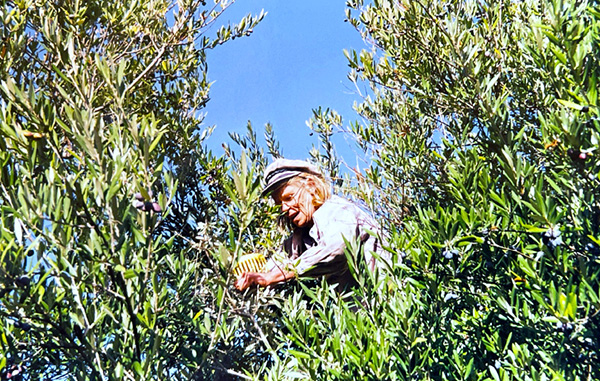
Carolina Matthews was an English author who spent most of her life living on the Island of Amorgos in Greece. Carolina’s best known books, The Mad Pomegranate Tree and At the Top of the Muletrack recounted her travels in Greece as a young woman in a way that described the locals and the country in an honest and compelling manner that encouraged people to visit the more out of the way destinations and also gave interested readers an insider’s view of these remarkable places that was very different from any available guidebooks. Her courageous independence lead her to a life that was in stark contrast to her peers born in England in the late 1930s.
Was she Carol, Carola or Carolina?
When another daughter arrived, we found it much harder to come to a decision, but it was Christmas time and the house was filled with the sound of carols on our newly acquired wireless set. Joan sent us a telegram from Paris saying “Why not Carol?” and we settled on that. But it wasn’t a great success. She herself didn’t like it and preferred to lengthen it to Carola. Later when she lived in Greece her friends and neighbours there turned it into Carolina and that seems to suit her very well.
- Molly Matthews – the Matthews Ancestry
Carolina was born just before the 2nd World War began and at the age of 2 she and her brother Henry (5) and sister Imogen (7) went to America with their mother, leaving their father behind to aid in the war effort in his capacity as Headmaster of Battenhouse, Haileybury. The family was separated for 4 years and while it must have seemed a bit of an adventure to the young siblings it was terribly difficult on the family, especially their mother, to be away from their home and from Carolina’s father, Edgar. The program of sending women and children to the Americas was halted just a week or so later when a ship, full of women and children was sunk by a German U-boat on the Transatlantic crossing. Many drowned in the tragedy and the British government decided that while the risk of staying in England was significant, the risk of sailing the youth of England across the Atlantic was too great. This remarkable chapter in the Matthews family story is beautifully recounted in the book “The War Years” by Carolina’s mother, Molly Matthews.
Carolina’s mother, Molly Matthews, née Carrington, was, herself, a celebrated author who had an exciting children’s adventure novel published when she was young and later published books on geneology, the origins of names, and English words and history. Her books were published under the name C.M. Matthews by such publishers as Oxford University Press, Cambridge University Press and Scribners. Molly’s siblings were also celebrated authors and so the family tradition passed on to Carolina.
Carolina’s father, Edgar, spent his career teaching at Haileybury, an esteemed public boarding school (which would be called a “private school” in the United States) in Hertfordshire, England. Writing, Theater and the Arts surrounded the Matthews children and a love of learning, of travel and of academic pursuits defined Carolina’s early years.
Carolina’s travel adventures began in in her early 20s. In her words:
When five thousand pounds came from some property into my father’s hands in 1959, he saw that as one thousand each – one for each member of the family. A crumbling Cotswold house would consume my parents’ portion, raising a family would consume my sister’s, getting married consume my brother’s – mine was simply a thousand pounds, a dazzling sum, a mystery. It did not occur to me, as my parents hoped it would, that this was my opportunity to learn to drive and exchange an unstable Lambretta for a car. Rather it occurred that in a similar situation at about the same age my father had departed for Morocco. ‘Why don’t you go abroad’, my brother said, ‘and rent a house, say on a Greek island? You could write then and let rooms to tourists to keep the balance.’ Now that was being tuneful to my mood.
I was not rebellious. I had nothing to rebel against. I was being my father’s daughter when I became a teacher and a daughter of my forebears when I chose Devon for the setting, romantic Devon where one great-great-grandfather had been acclaimed The Dartmoor Poet and given a pension by George III at about the time when Keats was being slanged by the critics. I had no complaint but that I was doing what I had been doing for ten years, going to school in the term-time and home in the holidays. There had been foreign journeys, much fun, many activities, but all that I had grown old enough to learn about my earliest, most serious ambition was that I was too young and inexperienced to have anything to say on paper that could possibly interest anyone. Henry was answering my cry – made when I was two years out of college – ‘I can’t be a schoolmarm all my life.
He was an excellent brother, an elder brother with an old Ford car who drove me about Europe in our student days and had such glittering ideas. This one came out in a sentence or two, as simple as I have reported it, and I answered with huge eyes and no hesitation. ‘Yes, that’s what I’ll do.’
- Carolina Matthews – Going out the In Way
And so her adventure began. Carolina lived part time in Mykonos and also had a teaching position in Athens. Carolina’s observations of the Greeks and the stories of this time are well recounted in her best known books The Mad Pomegranate Tree and At the Top of the Muletrack. Later in life Carolina gave a more frank, personal recounting of that time in her book “Going Out the In Way”.
Mykonos at that time was enchanting. There were two old buses, four old taxis, nothing else on wheels. The electricity went off from two to five, afternoon and night, so we had ice-boxes and bought daily ice-blocks. There were no foreigners as I remember
- Carolina Matthews – Going out the In Way
Toward the end of that book Carolina discovers the Island of Amorgos, soon to become her life-long home. Amorgos, the most remote of the Cyclades Islands is long and rugged and has two disctinct ends, each with its own port. The port town of Katapola was the more modern with, at that time, a few paved roads and electricity but Carolina was more enticed by the traditional living at the northern end of Amorgos, known as Aigiali. The two were separated by a rugged mountain pathway, a six-hour walk at a good pace, but most people traveled from end to end by boat. Above the beautiful beaches and remote port of Aigiali were 2 picturesque mountain villages, Tholaria and Langatha, the latter of which became Carolina’s home.
Carolina found a centuries-old traditional home in Langatha, in a state of considerable dis-repair, which she embarked on rebuilding in the traditional style. Laughter and Anguish in the Cyclades describes this time period and the joys, challenges and frustrations that Carolina experienced while trying to make Langatha her home. At that time the only access to the village was up the 1.5 mile Muletrack, the stone paved path of indeterminate age that Carolina immortalized in At the Top of the Muletrack. There was no road, electricity or running water and the only connection to the outside world, other than the somewhat-regular boats, was the telegraph office down at the port. It was not until the 1980s that the roads arrived, connecting the mountain villages to the port and the port to the other end of the island.
Initially, on Amorgos, Carolina bartered English lessons for food and lodgings and her English lessons were credited as the basis of success for her pupils who went on to become the heart of the tourist industry in Aigiali. Carolina became a stalwart member of the Amorgos community, teaching English to generations of locals, hosting travelers in her homes and translating island Greek to the international community.
About the time the roads and electricity arrived in Langatha, Carolina took on another building project, revitalizing a ruined house in the long-deserted village of Stroumbos, a 25-minute walk down into a gorge below Langatha. Carolina built many wonderful spaces on the property and loved staying there for much of the year, living an ascetic lifestyle in this place that, to this day, has no electricity or access other than a scramble of a donkey path. There are now a handful of rebuilt homes in Stroumbos, a revitalized small community built around Carolina’s inspiration.
In her later years Carolina maintained her 2-house living arrangement despite her increasingly frail body. The walk down to Stroumbos took longer than it used to, but she would not choose to do it any other way. Carolina died of natural causes in the autumn of 2020 while the island was locked down in the midst of the Coronavirus Pandemic. The people of Langatha came together to make a beautiful funeral procession through the village where she was honored as a valued member of the community. The island tradition of a loaf of bread delivered to each household in her honor was upheld, and in 2021 a contingent of her family, her brother Henry and his wife Susan, her nephew Zac and his wife Demery with their sons Devin, Dexter, Reid and Aaron, along with treasured friends, were able to come together to celebrate her life with a ceremony at her gaveside and a feast with traditional Greek music at one of her favorite local restaurants.
Through her writing, Carolina introduced the charms of Greek life and her cherished Amorgos to a world of readers and travelers who were looking for more than just the usual tourist hotspots and with the homes in Langatha and Stroumbos she built a place that her family would come back to, year after year, to visit and enjoy. Carolina’s family are now honoring her life by maintaining the homes that she created and sharing them with friends and acquaintances who are looking for a peaceful place to get away from the bustle of the modern world where they can enjoy the simple traditional pleasures that Carolina so loved.
Carolina's Books:
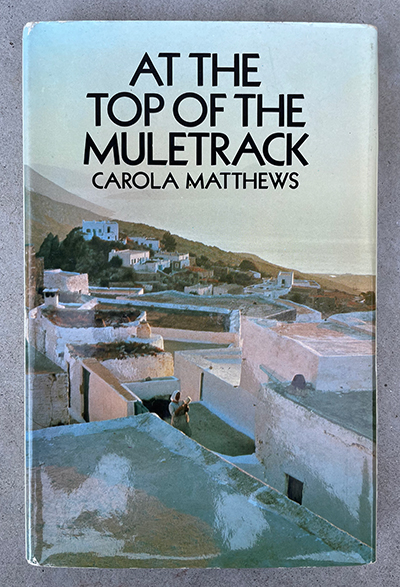
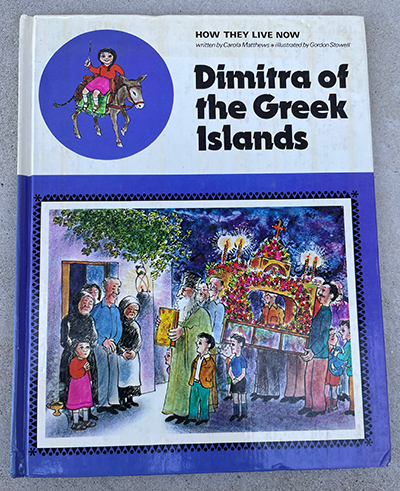
Carolina taking deliveries, the traditional way.
Carolina
Carolina
Carolina
Carolina with Anna, the Matthews nanny who came with them to Amorgos. Anna fell in love with the island, and with a man and stayed for a very long time.
Carolina at her second home in the (almost) deserted village of Stroumbo, with her nephew Zac.
This Certificate honoring Carolina's restoration work.
*While Carolina is locally described as "The first English Tourist on Amorgos, it is not an entirely accurate description. There is a well known recounting a visit to Amorgos by an English couple, the Bents, who visited in April of 1883. There have been, doubtless, others" Click here for another article about tourism on Amorgos which tells some history and mentions Carolina's contribution to tourism on the island (Article in Greek, using Google Translate).
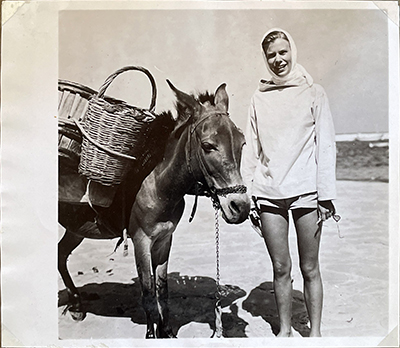
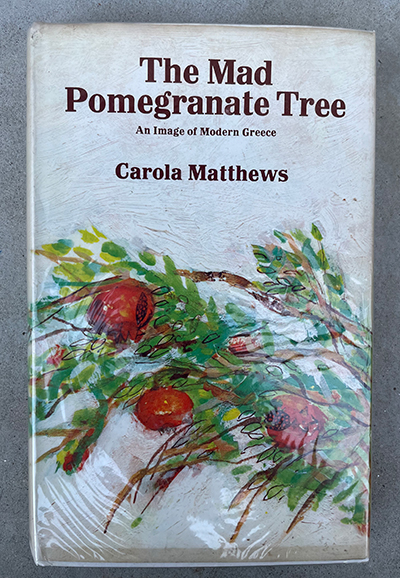
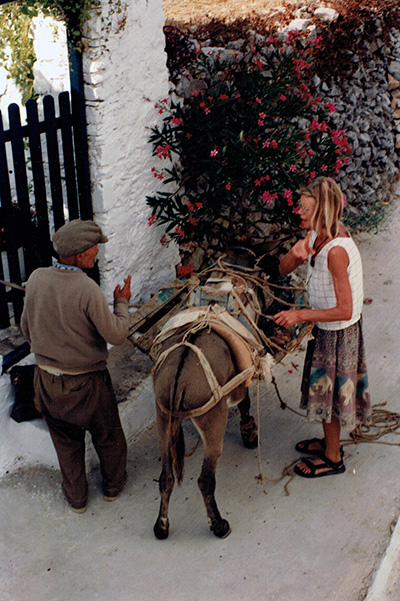
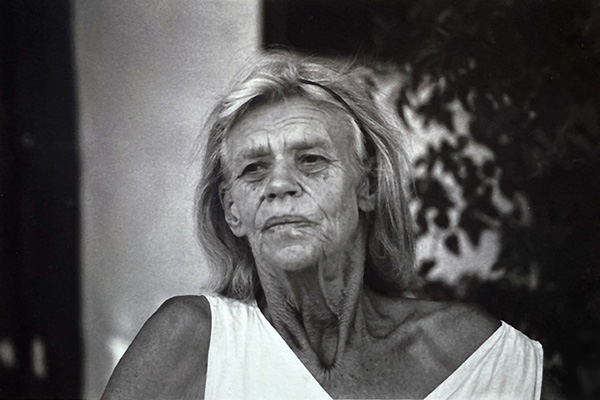
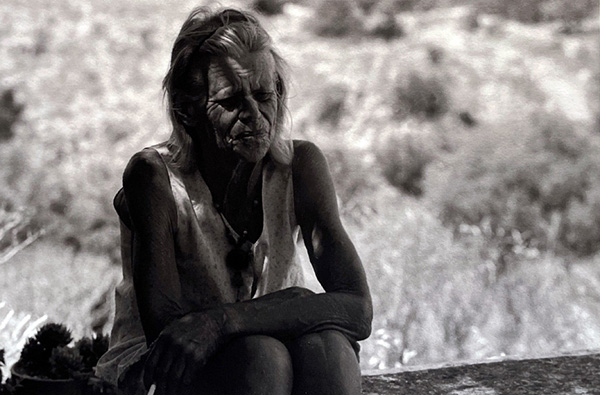
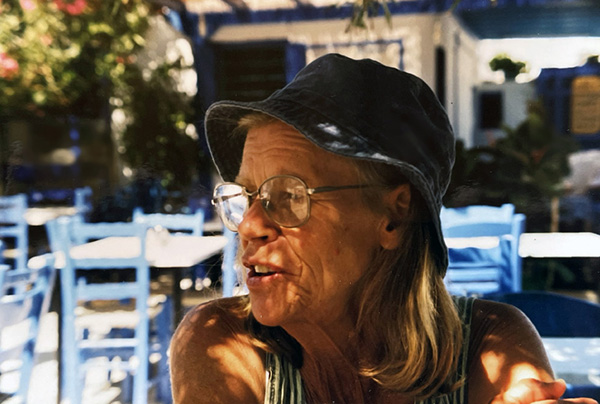
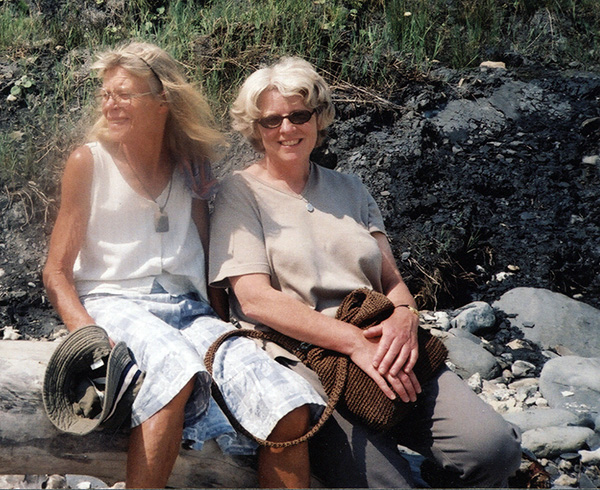
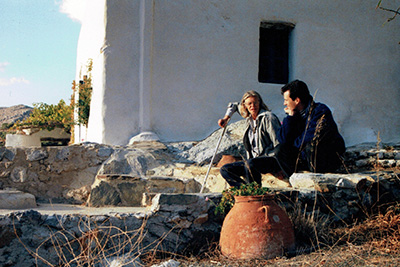
 Carolina/10 Carolina CertificateTN.jpg)